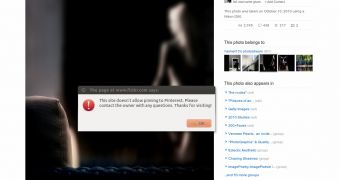Pinterest is continuing to generate interest and controversy at the same time. While its surge in popularity makes it hard to ignore, the attention it got also managed bring up the question of copyright infringement.
At its core, Pinterest relies on images from across the web. While the terms of service say that users have to own the images, have permission or the right to post them, it doesn't really work out that way in practice, the site wouldn't have become as large as it did without it.
And, of course, this has led to problems, some photographers, while happy to have their work displayed on their personal sites or the sites they choose, don't want others to repost the images elsewhere, with or without attribution, where they don't have control over them.
This has led to Pinterest introducing a way of blocking images from being pinned on the site, a small piece of code that photographers or websites have to add in order to let Pinterest know that they don't want their photos copied.
It's not the greatest of solutions, but it's a step in the right direction. One of the big problems with it is that people rarely have control over the sites they use, unless they own them. Even then, they may lack the ability to edit the site's source code and add the snippet.
This is why Flickr's move, to add the code for certain photographs, is interesting. The site is now blocking Pinterest for images that are not public, not safe, i.e. those with an adult theme, or for those which the user has disabled sharing.
“Flickr has implemented the tag and it appears on all non-public/non-safe pages, as well as when a member has disabled sharing of their Flickr content,” Flickr explained. “This means only content that is ‘safe,’ ‘public’ and has the sharing button enabled can be pinned to Pinterest.”

 14 DAY TRIAL //
14 DAY TRIAL //